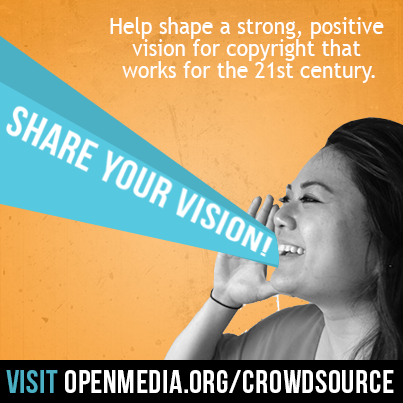In 2013, Canadian astronaut and all-around cool dude Commander Chris Hadfield sang, recorded, and filmed a cover of David Bowie’s stargazing classic “Space Oddity.” The music video was a fitting tribute to the Bowie hit and Hadfield’s time aboard the International Space Station. On the anniversary of his return to Earth, Hadfield’s one-year license to use the song expired and he was forced to take the video down from YouTube.
Technology has enabled us to send a man into space for months at a time, where, in addition to conducting important scientific research, he shared his experiences with the rest of us on the ground via social media and live satellite feeds. Despite these incredible technological advances, laws for sharing and collaborating online have lagged behind for decades, resulting in scenarios like the above. Here’s a brief run-down of why rules for sharing and collaborating online need to be modernized and what you can do to help.
As they stand today, overly restrictive copyright laws are often bad for artists. When Hadfield posted his video for Space Oddity, it generated huge buzz for the original songwriter, David Bowie. Far from discouraging the cover, Bowie shared it with fans and used it as a launching point for his first album in years. When people produce covers, fan fiction, and other adaptations that borrow from published works, they often help to spread the original work of art much further than it could have reached by traditional means. Furthermore, unlike space, art doesn’t exist in a vacuum — there really is no art or culture without borrowing and sharing.
Extreme copyright laws don’t save the industries and businesses that generate art and culture either. Recent studies show that these businesses survive just fine on their own despite the impact of new technologies, and that severely restrictive laws around collaborating and sharing online do very little in the way of boosting these industries.
In short — the Internet has changed the way that we create and share art with each other, making it easier for ordinary people and extraordinary creatives to generate, upload, and share their own content, making our culture far richer. Help us keep it that way by using our innovative drag and drop crowdsourcing tool for developing modern rules for sharing and collaborating online. Then share it with everyone you know — you could win awesome pro-Internet prizes.
It’s time that the laws around collaborating and sharing online caught up with the 21st century so that our imaginations and our art can soar where they belong — up among the stars. Don’t miss this chance to make sure your voice gets heard.



